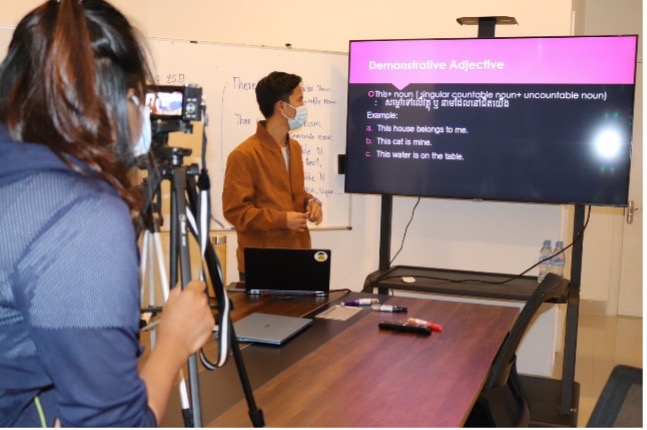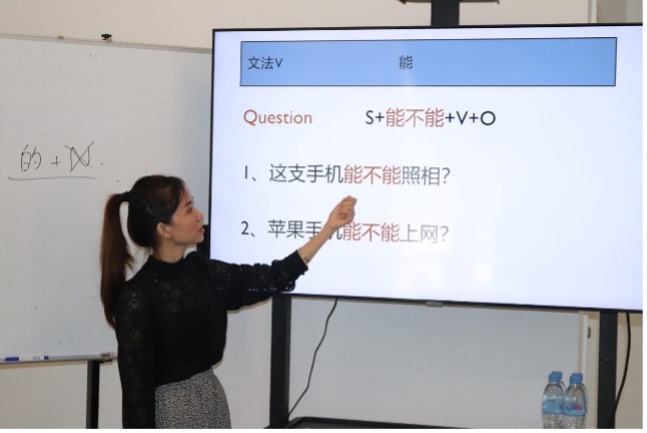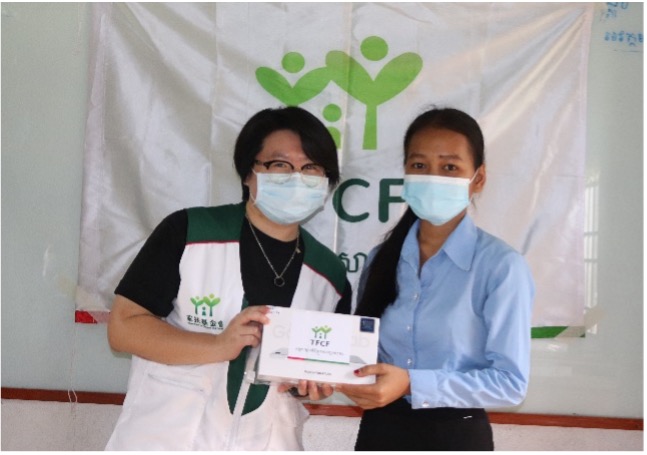Cambodia: Let Technology Stop being an Obstacle to Learning
.jpg)
Finding the issues
At the beginning of 2021, the pandemic situation in Cambodia began to improve, the government once again allowed the students to return to schools. However, this improved situation didn’t last long, a few months later, the school closure was imposed, but this time, indefinitely. Even though school closure could indeed reduce the possibilities of outbreaks in school, it creates problems such as interrupted learning. Restrictions such as no gathering also let our work to assist underprivileged children even harder.
During the pandemic lockdown in 2020, The TFCF Cambodia Branch Office, which locates in Phnom Penh, conducted phone interviews with our supporting families to understand their experience with the E-Learning System produced by the Cambodia Education Department. The result shows that every 4 in 10 families are not using the E-Learning System because of lack of equipment (smartphones, computers) or aren’t even aware of this learning resource.
After learning about this issue, we continue to provide information about the E-Learning platform to those who still aren’t aware of it to make sure that their rights to learning wasn’t being delayed. We were also considering the way for us to adjust our work. We were analyzing the finding of the needs of the families’ interviews and applied them to the different services we provide to multiply the effect and effort of the program.
Our Response
The Cambodia Branch Office started the “Elite Student Program” to support students who have a good spirit and great potential. Besides the scholarship, we also provide them with Chinese and English courses to cultivate their language skills and to come to Taiwan one day to study.
These courses aim to elevate students’ language skills as well as other important purposes, such as inspiring motivation to study, improving self-confidence, and cultivating soft skills. After a series of auditions, Chanty (pseudonym) was on the list for the 2020 cohort.
Chanty’s school performance wasn’t particularly outstanding, her English skill remained at basic vocabulary and greetings. When she showed up for the interviews, her body language was exhibiting a lack of confidence, and speaking about her motivation of joining the program in Khmer quietly. However, her sincerity and potential moved the judges, and her application was then accepted.
Not long after the course started, the COVID-19 cases started to show in Cambodia, the government in-response imposed a series of policies to curb the cases, which in turn became an obstacle for the TFCF Cambodia Branch to continue in-person courses in the office, and had to switch to paper handouts and practice exams for students to practice at home. After our evaluation, we decided to separate our sponsoring children into two groups, those who had “communication technology” and those who didn’t, to provide services that meet their needs.
For those families who had communication technology, sometimes, the typical situation involved being unable to find the right information on distance learning, such as the right website for the platform, the timetable for when the learning materials would be played. Other times the issues involved equipment, many families had limited cellular data plans, which is often not enough for a month’s usage. Even if the families had the technology, it’s no use without the internet data. To prevent this kind of situation from happening, we assisted every students’ family with the money to buy more internet data, to let every student have enough data to learn remotely.
As for the English and Chinese courses the Cambodia Branch Office offers, we hoped to create more value from them. Therefore, since last September, we worked with teachers who were supposed to teach in-person to record their courses beforehand and upload them to an online learning platform, to let the children watch at home repeatedly without interruption.

We even tracked the students’ learning status with the teachers, and evaluate their learning effectiveness through practiced questions, exams, and reviews.
I bumped into Chanty one day accidentally, she confidently shared with me that she was able to use a secondhand smartphone to replay the courses to make sure she understood everything in the courses. I was impressed with her confidence and improvement.
Up to November 2020, the number of Chinese and English courses videos recorded and uploaded onto the platform had risen to 88. Besides uploading new videos in the future, we also planned to categorize these videos into a learning database from easy to difficult levels. These experiences and arrangements had us believe that as long as the user can overcome the obstacles of hardware, the technology can create much more value.

However, the issue that’s been on our mind was the other group of students who didn’t have the communication technology. We were planning to play the recorded courses in the community center and limited the number of participants to 3-5 people at a time. But, because of the limitation of the number of participants, and the lockdown policy the government imposed from time to time, the plan was hard to implement in reality.
Changes We See
Fortunately, the director of the United Charity Phnom Penh, Claire, had donated 6 kinds of Chinese, English, and Khmer Audiobooks with a talking pen for children to let children borrow and to continue their study during the pandemic.
One of the children who had borrowed the audiobooks shared, “this had helped me learn Chinese and English. And when I am busy doing the house chores, my little brother and sister could also use the audiobook to learn Khmer, and they even sang English songs with me from time to time. Mihong, a mother who was returning the audiobook shared with our social worker that, “I read with the children sometimes, and it made me feel like I was a student again.”
In September 2020, the Cambodia Rotary Club Of Phnom Penh Capital donated another 10 audiobooks and sign an MOU with the Cambodia Branch Office. We made the effort to make sure that every child had a chance of using the audiobooks, to reduce the gap of learning inequality, and let the service reach more children who are in need.
Besides the work in Phnom Penh Capital, we also work with organizations in Svay Teab District to push for a plan to promote digital learning in remote places. Provide them with tablets, internet sim cards, and online learning resources. We are also exploring the possibilities of expanding our service in the region.
We planned to establish two locations of E-Learning Library in the Phnom Penh Capital, to let the resources more accessible to the children and to improve the effectiveness of the program. TFCF Cambodia Branch Office believes that technology isn’t just a temporary solution during the pandemic, if used wisely, it could improve children’s overall education quality.

If you want to support our work in Cambodia, you can join us here.
